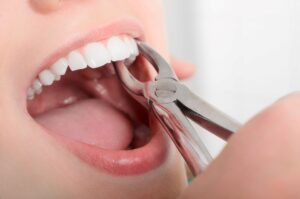
Many patients get anxious about tooth extractions because they worry that the procedure will be long and agonizing. Fortunately, that’s not usually the case. During your appointment, your dentist will apply a local anesthetic so you don’t experience any discomfort and can offer sedation options for those who are overly anxious. That means you’re not likely to feel much during the removal itself. Afterward, however, it’s important to care for your mouth properly to avoid a painful complication known as dry socket. Keep reading to learn more about this condition and how you can prevent it!
What is Dry Socket?
After your dentist pulls your pearly white, you form a blood clot over the surgical site that protects the underlying bone and nerve endings while you heal. Ideally, it will remain in place until your gums and mouth are fully mended. In some cases, however, it becomes dislodged which exposes the tender materials underneath. Harmful bacteria can penetrate the area which both causes discomfort as well as slows the recovery process. This condition is known as dry socket, or alveolar osteitis.
How Can I Prevent Dry Socket?
Your dentist will give you several post-op instructions to help you heal as quickly as possible without developing complications, so the best thing to do is to follow their orders in detail. Some additional tips include:
- Watch what you eat. You shouldn’t eat anything hard, sticky, or chewy for several days following your appointment. Also, steer clear of foods that are overly sugary, caffeinated, or alcoholic because this can attract unwanted microbes.
- Don’t use straws. The suction created by the movement of air and your cheek muscles is enough to damage your blood clot.
- Avoid tobacco products. Cigarettes, vapes, and chewing tobacco all contain nicotine which can reduce blood flow and oxygen levels. It impairs your body’s ability to deliver essential nutrients to your teeth and gums which are required to recover properly. If you aren’t able to quit, you can try nicotine patches, instead.
- Plan to rest. You’ll need to take it easy for a few days and forego any activities that can elevate your heart rate. You might need to take a couple of days off work or ask for help with household chores.
- Drink water. Consuming plenty of H2O can flush germs out of your mouth while simultaneously keeping your body hydrated to support your immune system.
If you develop dry socket despite these precautions, call your dentist and let them know. They may want to see you back in the office or offer helpful suggestions over the phone. Often, you can alleviate symptoms with over-the-counter medications like Tylenol or ibuprofen, or with a numbing gel intended for oral use.
Now that you know more about how to prevent this painful complication, you can take steps to help keep your healing on track!
About the Practice
At Legacy Dentistry, you and the entire family benefit from several experts who provide a full range of services under one roof, including tooth extractions. They believe that with the right approach, dental care can improve your life by enhancing your oral well-being. As a result, they strive to treat each patient with the respect and honesty they deserve. By using state-of-the-art technology, they can quickly identify any areas of concern and create individualized treatment plans to meet your unique needs. If you have developed dry socket following an extraction and need help, you’re welcome to contact the office on the website or by calling (972) 723-1148.

